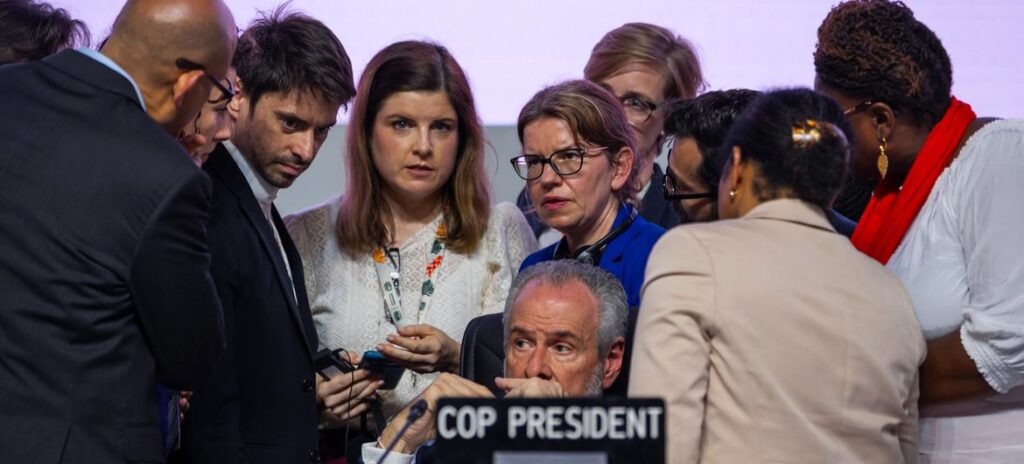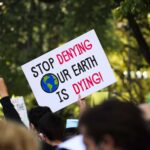COP30 in Belém closed with a landmark financial package to speed up global climate action, but stopped short of the one pledge many countries and campaigners desperately wanted: a firm commitment to phase out fossil fuels.
After two weeks of tense negotiations and an all-night final session, delegates agreed to mobilise $1.3 trillion annually by 2035, dramatically scale up adaptation funding, and operationalise the long-awaited loss and damage fund.
But the text avoided explicit language on ending oil, gas and coal — the main drivers of global warming.
UN climate chief Simon Stiell summed up the moment:
“A new economy is rising, while the old polluting one is running out of road.”
A Deal With Big Ambition — Except on Fossil Fuels
The COP30 outcome includes:
- $1.3 trillion per year for climate action by 2035
- Double adaptation finance by 2025, triple by 2035
- Loss and damage fund made operational
- Global Implementation Accelerator launched to help nations deliver Paris Agreement goals
- Belém Mission to 1.5°C to raise ambition
- A commitment to tackle climate disinformation
Yet the most politically sensitive issue — fossil fuels — was pared back. More than 80 countries had backed Brazil’s proposal for a global roadmap to phase out fossil fuels. It was in early drafts. It vanished in the final hours.
The compromise text only “recalls” the COP28 UAE Consensus, which called for “transitioning away from fossil fuels.”
For climate scientists like Carlos Nobre, this omission carries heavy consequences. He warned that global fossil fuel use must drop to zero by 2040–2045 to avoid catastrophic warming of up to 2.5°C — a scenario that could collapse the Amazon rainforest, kill coral reefs and destabilise ice sheets.
Finance, Trust and a Push Against Disinformation
The final agreement is also the first COP decision to directly acknowledge the threat of climate disinformation, pledging to safeguard information integrity and protect science-based policy.
This was especially symbolic at a summit President Lula described as “the COP of truth.”
Two major implementation tools were launched:
- The Global Implementation Accelerator, to help countries turn climate pledges into action
- The Belém Mission to 1.5°C, designed to keep the world focused on limiting the temperature rise.

Roadmaps for Forest Protection and a Just Energy Transition
COP30 President André Corrêa do Lago acknowledged the frustration of many countries — especially youth groups and vulnerable nations — who wanted stronger commitments.
He pledged two new roadmaps:
- A plan to halt and reverse deforestation, spotlighting the Amazon and Congo Basin
- A roadmap to transition away from fossil fuels, in a “just, orderly and equitable” way
These efforts aim to rebuild trust and lay the groundwork for a more ambitious energy agreement at future COPs.
A Summit Marked by Tension and Resolve
Belém’s COP was not without drama: Indigenous groups held blockades demanding stronger Amazon protections, and a fire at the venue briefly disrupted talks. Yet negotiators ultimately delivered 17 decisions alongside the main Mutirão agreement — a document declaring the shift toward low-carbon, climate-resilient development as “irreversible.”
UN Secretary-General António Guterres, speaking from the G20 Summit, called COP30 proof that “multilateralism is alive,” even if the summit fell short in key areas.
Beyond Negotiation: Billions Pledged for Action
The Brazilian presidency highlighted major voluntary commitments:
- $5.5 billion raised for the Tropical Forests Forever Fund
- $300 million for the Belém Health Action Plan targeting climate-driven health risks
- Public utilities through the UNEZA Alliance pledged $66 billion annually for renewables
- Local governments and companies reported cutting 850,000 tonnes of CO₂ in 2024
Climate justice featured prominently, with countries agreeing to design a global just transition mechanism to support vulnerable communities.
The Work Starts Now
COP30 ended with optimism and urgency. The financial commitments are historic. The solidarity is notable. But without a clear fossil fuel phase-out, the world still faces an uphill battle to keep 1.5°C within reach.
As Stiell warned:
“Humanity remains in the fight for a livable planet — but we must go further and faster.”










